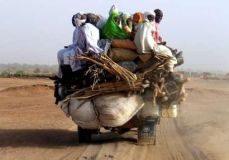Chadian delegation arrives in Abuja Darfur peace talks
ABUJA, June 15 (AFP) — A delegation from Chad, co-mediator in the Darfur crisis alongside the African Union (AU), arrived in Abuja late Tuesday to participate in the Sudanese peace talks, AU officials told AFP.

|
|
Internal displaced Sudanese sit on a vehicle with their belongings as they travel inside Aboushouk camp in Sudan’s Darfur province April 16, 2005. (Reuters). |
Chad has up till now not been represented in the talks which formally resumed here last Friday under the auspices of the AU trying to reconcile the Darfur rebels with the government in Khartoum.
One of the rebel groups, the Justice and Equality Movement (JEM), has rejected the mediation of Chad, a country neighbouring Darfur region, accusing it of being an “interested party in the conflict.”
The Chadian delegation was metting Wednesday with the AU special envoy for the peace talks, Tanzanian Salim Ahmed Salim, a spokesman of the continental organisation, Noureddine Mezni, said.
Delegates are expected to devote Wednesday to continuation of debate on the Declaration of Principle (DoP) which would serve as the basis for talks on political agreement between the government of Sudan and Darfur’s two rebel groups, the JEM and the Sudan Liberation Movement (SLM).
“Further talks will continue from 11:00 a.m. (1000 GMT) with our foreign partners, donors, facilitators and observers for their comments and inputs on the document (DoP),” Mezni told AFP.
He also said that the AU chairman, Nigerian President Olusegun Obasanjo, has been keenly watching the talks and in this week, Salim has twice briefed him on developments at the roundtable.
US Deputy Secretary of State Robert Zoellick has also telephoned Salim to express his government’s support for the talks and AU efforts to resolve the Darfur crisis, Mezni added.
At the end of close door meeting on DoP, other issues such as the power and wealth sharing as well as agreements on security would be concluded, AU said.
The last session of the peace talks failed last December 18 over failure to clinch an accord on ceasefire, over which the two parties traded accusations of violations.
Violence broke out in Darfur in February 2003 when a rebel uprising led Khartoum to unleash Arab militias known as the Janjaweed in a scorched-earth campaign. The Janjaweed have been accused of “ethnic cleansing”, torture, rape and intimidation.
Humanitarian officials have warned the situation in Darfur is becoming increasingly desperate, with insufficient funding to deal with the crisis aggravated by drought, famine and the long-term effects of conflict.
The more than two-year-old war has claimed between 180,000 and 300,000 lives, displaced around 2.4 million people and sent more than 200,000 fleeing to neighbouring Chad, sparking one of the world’s worst humanitarian crises.
